牛津译林版英语八年级下册(导学案)Unit 3 grammar
牛津译林版八年级英语下册Unit3知识点归纳汇总

牛津译林版八年级英语下册Unit3知识点归纳汇总我不知道。
I have no idea! 电视已经打开了。
The TV is turned on.1.它看起来像是一台电视。
It looks like a television.2.我们调台吧!Let’s change the channel.3.这个很无聊。
This one is boring.4.电脑的不同用途different uses of computers5.你用你的电脑做什么?What do you use your computer for?6.查找信息search for information7.八小时内环游世界around the world in eight hours8.一个叫做“八小时内环游世界”的新的教育光碟刚刚出版出来。
A new educational CD-ROM called “Around the World in Eight Hours” has just comeout.9.听起来很有趣,不是吗?It sounds interesting, doesn’t it?10.同时学英语和地理learn English and geography at the same time11.是南希设计的。
It is designed by Nancy./Nancy is the desighner./Nancy designed it.12.主角the main character 一朵金色的云 a golden cloud13.上面写着这些字these words were written on it14.上面写有不同问题的颜色各异的大云朵big clouds of different colours with questions on them 15.你每正确回答一个问题,就可以得到一分。
You get a point every time you answer a question correctly.16.得到足够的分数get enough points17.带你去你从来没有去过的地方carry you off to a place you have never visited before18.扮演···的角色play the role of19.如果你聪明,你能在八小时内环游世界。
牛津译林版八年级英语下册unit3单元知识点归纳总结

牛津译林版八年级英语下册Unit 3知识点一、重点短语1. look like 看起来像2. agree with sb. on sth同意某人观点3. agree to do sth同意做某事4. can’t wait 迫不及待5. come on 来吧,赶快6. cheer for… 为……欢呼7. enjoy oneself 玩得开心8. get on 上车9.鼠标(复数)mouse— mouses 老鼠(复数)mouse— mice10.chat(动词)with sb. have a chat(名词)with sb. 和某人聊天11. do word processing做文字处理12. send and receive emails收发电子邮件13. be fast and easy快捷14. almost every day几乎每天15. I have no idea.=I’ve no idea.=I don’t know.我不知道16. Around the World in Eight Hours 八小时环游世界17. at the top of the page在本页上方18. at the bottom of 在……底部19. further on再往前20. be famous/ known for21. be famous as+职业作…而出名22. so much for sth.关于......就讲这么多,......到此为止23. pick another city选择另一个城市24. pick up 捡起来/ 去(机场)接某人25. be filled with / be full of充满26.fewer than / less than少于27.more than / over多于28.fall from the sky从空中落下29.dream of / about doing sth梦想做某事30.book tickets and hotels 预定票和酒店31.order meals 订餐32.be made up of...由.....组成33.have a long history 有着悠久的历史34.the best time to visit 参观的最好时节35.prepare for…为……准备36.prepare to do sth.准备做某事e out:出版、发行;出来, 长出38.be filled with / be full of充满39.return from sp从某地回来40. return to sp 回到某地二、词汇梳理1. look like 看起来像(指长相,即可指人也可指物)What do/does sb. look like? 问长相=How do/does sb. look?What be sb. like? 问品质What do/does sb. like? 问喜好2.send and receive emails收发电子邮件(1) send 发送send sb. sth.=send sth. to sb.把某物寄给/送给某人(2) receive 收到,接到receive emails 接收邮件区分:receive 与accept receive 客观(被动地)收到accept 主观接受eg. I received a bunch of flower, but I didn't accept it.3. use sth… to do/ use sth. for sth. 用……做……4. turn on the TV →turn on/off打开/关闭…,turn up/down调大/调低;都是“动词+副词”。
Unit 3 第3课时 Grammar-八年级英语下册(牛津译林版)

in brackets.
I __w__a_s___ (be) in Hainan last month. Some of our classmates __h_a_s_n_’_t_b_e_e_n___ (not be) to Hainan yet.
I _h_a_v_e__li_v_e_d__ (live) in Sunshine Town since I was born. Daniel ___li_v_e_d___ (live) in Nanjing in 2007.
I
(2)
_h_a_v_e_s_e_e_n_
never
so
many
wonderful pictures before.
C
Complete their conversation with the correct forms of the words
in brackets.
be buy read return see show
I ___w_r_o_t_e___ (write) an email to my friend yesterday. Daniel _h_a_s_a_l_r_e_a_d_y_w__r_it_t_en__ (write/already) two emails.
B
Help them complete the sentences with the correct forms of the words
C
Complete their conversation with the correct forms of the words
in brackets.
Millie: (5) __D_i_d_y_o_u__l_ik_e__(you/like) it?
Unit 3【学案】八年级英语下册同步备课系列(牛津译林版)
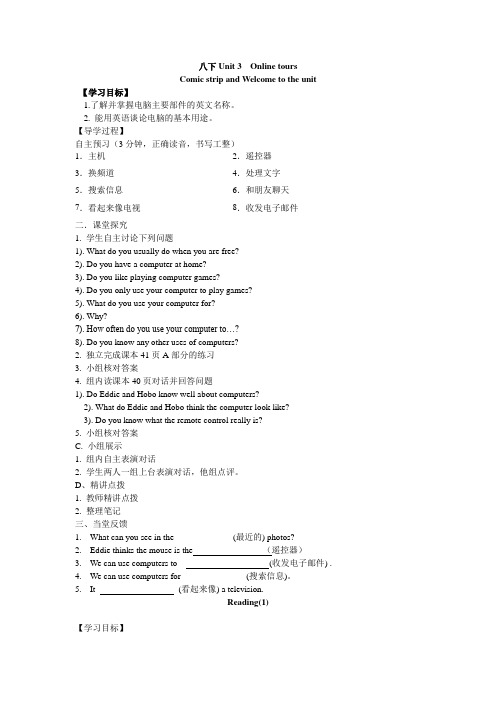
八下Unit 3 Online toursComic strip and Welcome to the unit【学习目标】1.了解并掌握电脑主要部件的英文名称。
2. 能用英语谈论电脑的基本用途。
【导学过程】自主预习(3分钟,正确读音,书写工整)1.主机__________________ 2.遥控器________________________ 3.换频道________________ 4.处理文字_____________________ 5.搜索信息_______________ 6.和朋友聊天__________________ 7.看起来像电视___________ 8.收发电子邮件_________________ 二.课堂探究1. 学生自主讨论下列问题1). What do you usually do when you are free?2). Do you have a computer at home?3). Do you like playing computer games?4). Do you only use your computer to play games?5). What do you use your computer for?6). Why?7). How often do you use your computer to…?8). Do you know any other uses of computers?2. 独立完成课本41页A部分的练习3. 小组核对答案4. 组内读课本40页对话并回答问题1). Do Eddie and Hobo know well about computers?2). What do Eddie and Hobo think the computer look like?3). Do you know what the remote control really is?5. 小组核对答案C. 小组展示1. 组内自主表演对话2. 学生两人一组上台表演对话,他组点评。
牛津译林版初中英语八年级下 Unit3Grammar
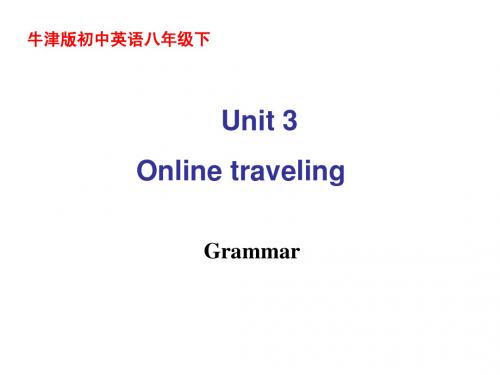
当主语是动作的执行者时,随后的动词用
主动态;当主语是动作的承受者时,随后的 动词用被动态。英语动词的主动态是没有 标记的,而被动态则是有标记的,通常由 助动词be + 及物动词的过去分词构成。 Many people speak English. (主动) English is spoken by many people. (被动)
He is called Itchy Feet.
3.In what color are the places you have
visited marked?
They are marked in bright purple.
a bookshelf, a wood bookshelf, store books
a key, a metal key, open and lock a door What’s this called in English? It _______ is called a key in English. What is it made of ? It is made of ______. metal What is it used for? It is used for _________________ opening and locking a door.
牛津版初中英语八年级下
Unit 3 Online traveling
Grammar
Revision
1.Who designed ‘Around the world in
eight hours’?
It is designed by Nancy Jackson.
2.What is the main character called?
牛津英语译林版-8下Unit-3-课时提优练习汇总-Grammar
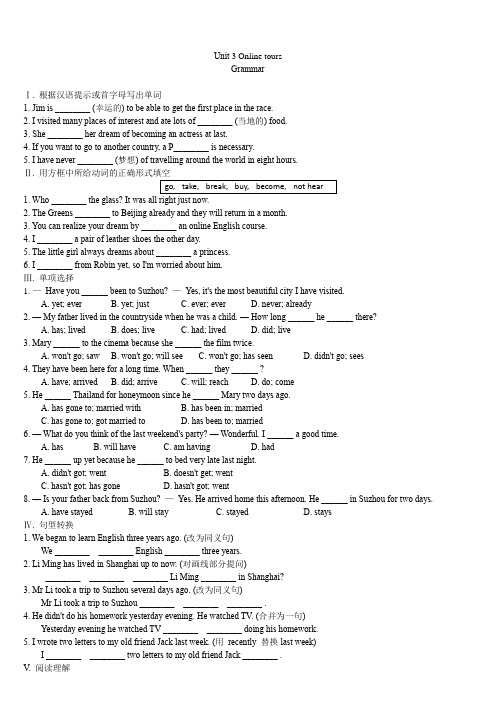
Unit 3 Online toursGrammarⅠ. 根据汉语提示或首字母写出单词1. Jim is ________ (幸运的) to be able to get the first place in the race.2. I visited many places of interest and ate lots of ________ (当地的) food.3. She ________ her dream of becoming an actress at last.4. If you want to go to another country, a P________ is necessary.5. I have never ________ (梦想) of travelling around the world in eight hours.Ⅱ. 用方框中所给动词的正确形式填空2. The Greens ________ to Beijing already and they will return in a month.3. You can realize your dream by ________ an online English course.4. I ________ a pair of leather shoes the other day.5. The little girl always dreams about ________ a princess.6. I ________ from Robin yet, so I'm worried about him.Ⅲ. 单项选择1.—Have you ______ been to Suzhou? —Yes, it's the most beautiful city I have visited.A. yet; everB. yet; justC. ever; everD. never; already2. — My father lived in the countryside when he was a child. — How long ______ he ______ there?A. has; livedB. does; liveC. had; livedD. did; live3. Mary ______ to the cinema because she ______ the film twice.A. won't go; sawB. won't go; will seeC. won't go; has seenD. didn't go; sees4. They have been here for a long time. When ______ they ______ ?A. have; arrivedB. did; arriveC. will; reachD. do; come5. He ______ Thailand for honeymoon since he ______ Mary two days ago.A. has gone to; married withB. has been in; marriedC. has gone to; got married toD. has been to; married6. — What do you think of the last weekend's party? — Wonderful. I ______ a good time.A. hasB. will haveC. am havingD. had7. He ______ up yet because he ______ to bed very late last night.A. didn't got; wentB. doesn't get; wentC. hasn't got; has goneD. hasn't got; went8. — Is your father back from Suzhou? —Yes. He arrived home this afternoon. He ______ in Suzhou for two days.A. have stayedB. will stayC. stayedD. staysⅣ. 句型转换1. We began to learn English three years ago. (改为同义句)We ________ ________ English ________ three years.2. Li Ming has lived in Shanghai up to now. (对画线部分提问)________ ________ ________ Li Ming ________ in Shanghai?3. Mr Li took a trip to Suzhou several days ago. (改为同义句)Mr Li took a trip to Suzhou ________ ________ ________ .4. He didn't do his homework yesterday evening. He watched TV. (合并为一句)Yesterday evening he watched TV ________ ________ doing his homework.5. I wrote two letters to my old friend Jack last week. (用recently 替换last week)I ________ ________ two letters to my old friend Jack ________ .V. 阅读理解The Internet is becoming important in our life. How much do you know about it? The following questions and their answers will help you to know more about the Internet.What is the Internet?The Internet is a large, world-wide collection (聚集) of computer networks (网络) . A network is a small group of computers put together. The Internet is many different kinds of networks from all over the world. These networks are called the Internet. If you have learned to use the Internet, you can have a lot of interest on the World Wide Web (网) .What is the World Wide Web?The World Wide Web has been the most popular development of the Internet. It is like a big electronic (电子的) book with millions of pages. These pages are called homepages. You can find information about almost anything in the world on these pages. For example, you can use the Internet instead of a library to find information for your homework. You can also find information about your favourite sport or film star, talk to your friends or even do some shopping on the pages. Most pages have words, pictures and even sounds or music.What is email?Electronic mail(email)is a way of sending messages to other people. It's much quicker and cheaper than sending a letter. If you want to use email, you must have an email address. This address must have letters and dots (点) and an @ (means"at") . For example: Lily@Yahoo. com. Write a message, type a person's email address, and then send the message across the Internet. People don't need to use stamps, envelopes or go to the post office because of the invention of the Internet. Quick, easy and interesting—that's the Internet.1. The Internet is ______ .A. a big computerB. lots of computer networksC. the World Wide WebD. a small group of computers2. The World Wide Web is like ______ .A. an electronic pageB. homepagesC. an electronic bookD. an interesting picture3. The sentence"You can talk to your friends on the pages." means ______ .A. your friends can come to your house to talk to you face to faceB. you can go to your friends' houses to talk to themC. you can talk to your friends through the same computerD. you can type your words in the computer4. People like to use email to send messages to their friends because ______ .A. they don't have to pay any moneyB. there are many advertisementsC. they don't need to have addresses, stamps or envelopesD. it's faster and cheaperⅥ. 首字母填空Want to go on holiday, but don't have enough money for luxury (豪华的) hotels and expensive trips? Backpacking might be right for youBackpacking is a very c___1___ way to travel outdoors. European students and young adults who don't have much money often do it. It is called backpacking because, i___2___ of using a suitcase, people put all their things in a large backpack. They c___3___ all the things inside.The most popular places for backpacking are Southeast Asia and South America. The cost isn't high in the countries and the w___4___ is warm for most of the year. And Australia is also very p___5___ . In 2002, over 40000 backpackers hit Australia.Sometimes, backpacking can be dangerous. You might walk on a less-travelled path and get into t___5___ . As a result, you'd better plan your trip well b___7___ you start and tell friends or family members about your plans.Backpacking, in fact, is much more than a holiday for young people in E___8___ . It is s___9___ as a way of learning about the world. Backpackers often travel a___10___ for many months. Besides finding the new world, backpacking, people say, is also about "finding yourself".GrammarI.1. lucky2. local3. realized4. passport5. dreamed/dreamtⅡ.1. broke2. have gone3. taking4. bought5. becoming6. haven't heardⅢ.1~5 CDCBB 6~8 DDCⅣ.1. have learned; for2. How long has;lived3. the other day4. instead of5. have written; recentlyV.1~4 BCDDⅥ.1. cheap2. instead3. carry4. weather5. popular6. trouble7. before8. Europe9. seen 10. alsoUnit 3 Online toursReadingⅠ. 根据汉语提示、首字母或英文释义写出单词1. The children wrote their names carefully at the ________ (底部) of their pictures.2. The price of travelling to ________ (欧洲) is high, but many rich people choose to go there for a trip.3. Most ________ (国际的) companies have grown from small family businesses.4. Shanghai is one of the biggest ________ (贸易) centres in China.5. The Great Wall in China is ________ (世界著名的) —almost everyone knows it.6. Every morning many people ________ (聚集) in Tian'anmen Square to watch the rising of our national flag (国旗) .7. The tour g________ is showing the visitors around the small city and telling them the history of it.8. The little boy p________ the smallest apple for himself from the basket.9. A holiday will help you ________ (to rest after work or effort) after your exams.10. I have been to Beijing ________ (more than two but not very many) times already.Ⅱ. 用括号中所给单词的正确形式填空1.Kunming is in the ________ (south) part of China. The weather there is pleasant all year round.2. The clouds moved across the moon, leaving us in total ________ (dark).3. I think Sweeney Todd is the best ________ (music) in the last 15 years.4. Next year, Lily will go to England to study ________ (far).5. We usually use the computer for ________ (chat) with friends.6. KFC is a good place ________ (relax)after a tough week's work.7. The tall building ________ (call) Dayuan has a long history.Ⅲ.2. — Is your school very big? —Yes. There are __________________ students in our school.3. — __________________ my home. Make yourself at home! —OK. Thank you.4. The English woman___writing thepopular book Harry Potter series.5. — Did you see anything unusual this morning? — Yes. I saw a small plane __________________ thr forest. I'm wondering if anyone was hurt.6. I __________________ my parents twice since I left home.Ⅳ. 单项选择1. — Do you know that the UK is ______ European country? — Yes, it is also ______ island country.A. a; anB. an; anC. a; aD. an; a2. — One of my eyes sees things less clearly than ______ . — Then you need to buy ______ pair of glasses.A. the other; anotherB. another; the otherC. another; anotherD. the other; the other3. — How can I start the computer game? —That's easy. Just ______ the icon and the game will start.A. put onB. click onC. click toD. try on4. I haven't been to the temple (寺庙) ______ the top of the hill. But I know you can get to the top ______ fifteen minutes by cable car (缆车).A. at; inB. in; inC. at; forD. on; after5. Nanjing is famous ______ a stone city ______ its hills.A. as; asB. for; forC. for; asD. as; for6. — Have you ever ______ the song My heart will go on? — Yes, many times. It is one of my favourite songs.A. thought ofB. heard fromC. heard ofD. thought about7. In the centre of the lakes ______ several boats. Some boys and girls are rowing boats.A. wereB. wasC. areD. is8. Every year ______ people come to my hometown to enjoy the flowers.A. two thousandsB. thousand ofC. thousands ofD. two thousands ofV. 同义句转换1. The Summer Palace is full of tourists from all over the country.The Summer Palace ________ ________ ________ tourists from all over the country.2. That's all for today's English class.________ ________ ________ today's English class.3. We should join in as many sports as we can.We should ________ ________ ________ as many sports as ________ .4. There are a few parks in the city of Xuzhou.There are ________ ________ in the city of Xuzhou.Ⅵ. 句子翻译1. 北京以其众多的名胜古迹而闻名世界。
Unit3Grammarv.ing形式做定语状语和宾语补足语讲义高中英语牛津译林版(1)
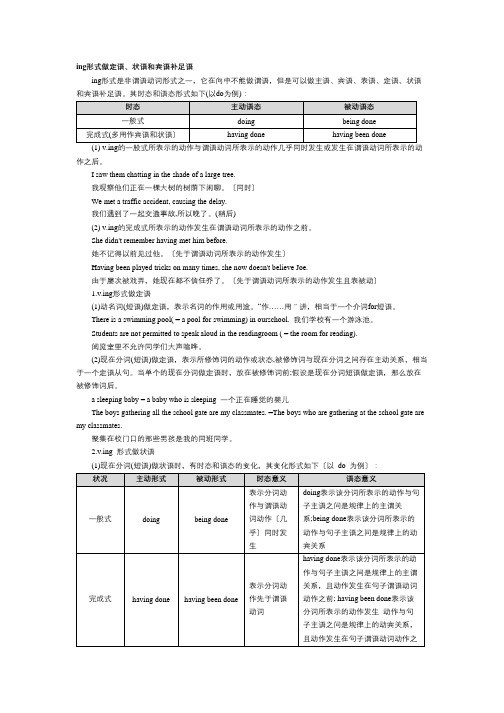
ing形式做定语、状语和宾语补足语ing形式是非谓语动词形式之一,它在向中不能做谓语,但是可以做主语、宾语、表语、定语、状语和宾语补足语。
其时态和语态形式如下(以do为例):(1) v.ing的一股式所表示的动作与谓语动词所表示的动作几乎同时发生或发生在谓语动词所表示的动作之后。
I saw them chatting in the shade of a large tree.我观察他们正在一棵大树的树荫下闲聊。
〔同时〕We met a traffic accident, causing the delay.我们遇到了一起交通事故,所以晚了。
(稍后)(2) v.ing的完成式所表示的动作发生在谓语动词所表示的动作之前。
She didn't remember having met him before.她不记得以前见过他。
〔先于谓语动词所表示的动作发生〕Having been played tricks on many times, she now doesn't believe Joe.由于屡次被戏弄,她现在都不信任乔了。
〔先于谓语动词所表示的动作发生且表被动〕1.v.ing形式做定语(1)动名词(短语)做定语,表示名词的作用或用途。
“作……用〞讲,相当于一个介词for短语。
There is a swimming pool( = a pool for swimming) in ourschool. 我们学校有一个游泳池。
Students are not permitted to speak aloud in the readingroom ( = the room for reading).阅览室里不允许同学们大声喧哗。
(2)现在分词(短语)做定语,表示所修饰词的动作或状态,被修饰词与现在分词之间存在主动关系,相当于一个定语从句。
当单个的现在分词做定语时,放在被修饰词前;假设是现在分词短语做定语,那么放在被修饰词后。
牛津译林版八年级英语下册学案 Unit 3 Grammar
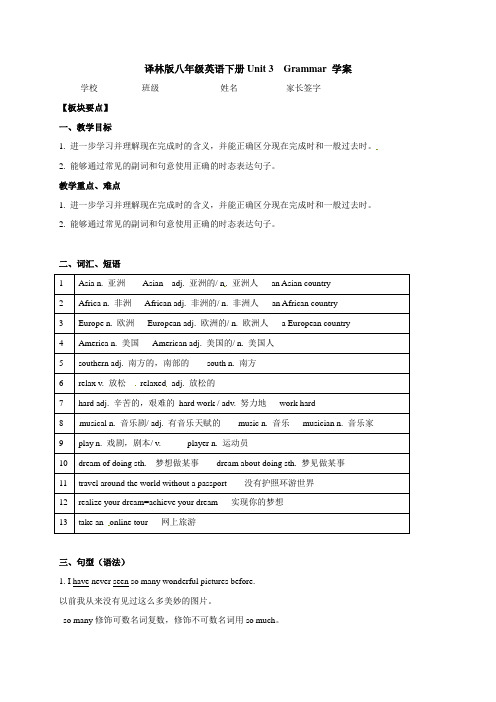
译林版八年级英语下册Unit 3 Grammar 学案学校________ 班级____________ 姓名__________ 家长签字___________ 【板块要点】一、教学目标1. 进一步学习并理解现在完成时的含义,并能正确区分现在完成时和一般过去时。
2. 能够通过常见的副词和句意使用正确的时态表达句子。
教学重点、难点1. 进一步学习并理解现在完成时的含义,并能正确区分现在完成时和一般过去时。
2. 能够通过常见的副词和句意使用正确的时态表达句子。
二、词汇、短语/ n.relaxedmusical n. 音乐剧/ adj. 有音乐天赋的music n. 音乐musician n. 音乐家online tour三、句型(语法)1. I have never seen so many wonderful pictures before.以前我从来没有见过这么多美妙的图片。
so many修饰可数名词复数,修饰不可数名词用so much。
I have so many good friends.我有如此多的好朋友。
Why is there so much food today? 今天为什么有如此多的菜?( )There are_______ people here. It's very crowded.A. so manyB. so muchC. too muchD. much too2. Have you ever dreamt of travelling around the world without a passport?dream在这里是动词,dream of doing sth.表示“梦想做某事”,含有有憧憬的意思;而dream about doing sth.表示“梦见(做)某事”。
e.g. 我小的时候就梦想成为一名优秀的老师。
I _________ _________ __________ an excellent teacher when I was young.我昨晚梦见在马路上碰见你了。
牛津译林版英语八下unit3Grammar

宜兴外国语学校初二英语导学提纲课题:8Bunit 3Grammar 设计人:王炜审核人:郑明英姓名:________ 班级:_________ 使用时间:2014/3 热线电话:80206666 评价:_______课前参与一、预习书本P40-42,完成书本上的练习。
二、重难点解析:一般过去式和现在完成时的区别1.一般过去时表示过去某个时间发生的事,存在的状态或经常发生的动作。
说话的侧重点只在于陈述一件过去的事情,不强调对“现在”产生的影响。
He visited Guilin in 1998. 他在1998年参观过桂林。
(只说明去桂林的时间) 例:两天前,他借了一本书。
Two days ago _________________________.2.现在完成时表示动作发生在过去,对现在造成了影响或产生了结果,不与确定的过去时间状语连用。
Jim has bought a new computer.吉尔买了一台新电脑。
(着重点是现在有了一台电脑。
)3.两种时态的区分1)一般过去时的谓语动词用过去式,而现在完成时的谓语基本构成是助动词have/has+done。
例:电影在7点钟开始。
______________________________________________他做教师已经很多年了。
______________________________________________2)一般过去时通常与表示过去的时间状语连用。
如:yesterday, last week, two years ago,just now, in 2002等;而现在完成时则常与just,already,ever, never等副词和for+一段时间,since…,so far, up to now, till/until now.等。
例在寒假的第一天,我们到达了香港。
_____________________________________________.他从来没出过国。
牛津译林版英语八年级下册Unit3 Grammar 参考教案

Unit3 Grammar 参考教案Teaching aims:1. To understand the differences between the simple past tense and the present perfect tense.2. To grasp the expressions with the present perfect tense.3. To grasp the expressions with the simple past tense.4. To understand different uses of the present perfect tense.Teaching Steps:Step 1 Revision完成句子。
1. 北京因万里长城而著名。
Beijing _____________ the Great Wall.2. 这条河是个钓鱼的好地方。
This river is a __________________ fishing.3.我三天前听说过这件事。
I _____________ this _______________.4.自从2000年起,他就在上海工作了。
He __________ in Shanghai ______ 2000. Step 2 PresatationTeach the new words.dream vi.& vt. 做梦,梦想dream about/of 想象;梦想e.g. Do you often dream at night?你在夜里经常做梦吗?I sometimes dream about my parents.我有时梦见我的父母。
I dream of becoming a teacher.我一心想当个教师。
Step 3 Grammar explanationTranslate some sentences.Daniel 两年前去了北京。
牛津译林版英语八年级下册Unit3知识点

8B Unit 3 Online tours 课文要点全解Comic strip & Welcome to the unit1.It looks like a TV.它看起来像台电视机。
look like“看起来像”。
2.I agree.我同意。
agree不及物动词,“同意”。
agree on“在……方面取得一致意见”,主语必须指协调的双方或多方。
agree to+ “提议、办法、计划”等的名词,意为“同意某事”。
agree with sb.“同意/ 赞成某人的意见”。
agree to do sth.“同意做某事”。
agree + 宾语从句,“同意……”。
3.Look,this programme began an hour ago.看,这个节目一小时前开始的。
begin(began,begun)不及物动词,“开始”。
begin及物动词,begin doing sth.和begin to do sth.都表示“开始做某事”。
4.It’s boring.它很枯燥。
boring形容词,“没趣的;令人厌烦的”,常用来说明事物具有的特征,故常修饰物;bored 是形容词,“感到无聊的”,常用来说明人的感受,故常修饰人。
用法类似的词还有excited,exciting;surprised,surprising;interested,interesting等。
5.Let’s change the channel.咱们换个频道吧。
let使役动词,“使,让”,let sb.do sth.“让某人做某事”,其否定结构为let sb.not do sth.“让某人不要做某事”。
let’s包括说话人和听话人双方在内,含有催促、建议或请对方一起行动的意思。
其反意疑问句的附加问句用shall we;let us表示请求对方允许自己(第一人称复数)做某事,这里的us不包括听话者在内,不能缩写为let us。
其反意疑问句的附加问句用will you。
牛津译林版英语八年级下册Unit3 Grammar 参考学案

Unit3 Grammar 参考学案【自学探究】一、用所给动词的适当形式填空。
1. With the medicine box under her arm, Miss Zhao ______(hurry) off to look after the man.2. Jim ______(make) many friends since he ______(come) to China.3. They ______(know) each other for about ten years.4. He ______ already ______(write) a letter to the factory to ask them to stop making noise.5. —When ______ she ______(leave)?—Two hours ago.6. —______ you ______(see) the film before?—Yes, I ______.—Where ______ you ______(see) it?—At The Queen’s Cine ma.7. —Thank you all the same, Mr. Black, but I don’t eat sweets.—Oh, I am sorry. I ______(not know) that.8. They usually ______(go) fishing when they lived there.9. How long ______ she ______(be) ill?10. They didn’t start to work in the field unti l the rain ______(stop).【当堂反馈】一、选择题。
()1. —I’m sorry, Cathy, I ______ your radio for such a long time.—Never mind.A. have borrowedB. have lentC. have keptD. have returned()2. —Where have you ______ these days?—I have ______ to Yangzhou with my friends.A. been, goneB. been, beenC. gone, beenD. gone, gone ()3. —Where is your father? We haven’t seen each other for weeks.—______.A. He has been to AmericaB. He has gone to EnglandC. He is going to AustraliaD. He would visit my grandparents()4. They have ______ since the factory opened.A. left the schoolB. joined the teamC. become workersD. worked here()5. Jim ______ the Great Wall many times.A. went toB. goes toC. has gone toD. has been to()6. It ______ ten years since they ______ to France.A. was, movedB. was, have movedC. is, have movedD. is, moved()7. —______ to the United States?—No, never, but I went to Canada a few years ago.A. Have you beenB. Have you goneC. Did you goD. Will you go()8. I won’t go to see the film tonight because I ______ my ticket.A. didn’t loseB. have lostC. will loseD. didn’t have()9. Miss Wu has taught in this school ______.A. for ten yearsB. ten years agoC. since ten yearsD. for ten years ago()10. I ______ today’s homework already. What about you?A. have finishedB. FinishC. to finishD. finishing()11. —Ann has gone to Shanghai. —So ______ her parents.A. hasB. hadC. didD. Have二、同义句转换1. My father came back the day before yesterday.My father has ______ ______ for two days.2.. My uncle bought the new car two months ago.My uncle has ______ the new car ______ two months ago.3.. They left Changsha an hour ago.。
牛津译林版英语八年级下册 Unit3 Grammar 课件

already, just, yet, ever, never, recently, before,for +一段时间, since+过去的时间点/时间段+ago/从句, these years, so far, up to/till now,
in/during/over the past /last few/three years, several times等连用
Millie: Lucky you! I (9)h__a_v_e_n__e_v_e_r_b_e_e_n_(be/never)there.
Millie is writing about the USA in her diary. Complete her diary entry with the correct forms of the verbs in the box.
Millie: (5)__D_i_d_y_o_u__li_k_e_ (you/like) it?
Simon: Oh yes. I (6)___h_a_d____ (have) a great time there. I (7)__v_i_s_i_te_d___ (visit) many places of interest and (8)____a_te_____ (eat) lots of local food.
过去发生的 动作,与现 在有联系。
一般过去时和现在完成时的区别(III)
Tense(时态) The time expressions(标志词)
the simple past tense(一般过
yesterday, last year, in May, in+过去 某一年,two days ago, just now等
牛津译林版英语八年级下册Unit3Grammar优秀教学案例

1.设计课后作业:让学生运用一般现在时的被动语态描述家庭、学校等场景。
2.鼓励学生创新,用所学语法知识表达自己的观点和感受。
3.教师对学生的作业进行评价,给予肯定和鼓励,激发他们的学习积极性。
4.引导学生反思自己的学习过程,总结经验教训,不断提高自己的英语语法水平。
五、案例亮点
1.情境教学法:本案例通过创设学校图书馆的真实场景,使学生在具体的情境中感知和运用一般现在时的被动语态。这种教学方法有助于激发学生的学习兴趣,提高他们的语言实践能力。
5.通过反思与评价,让学生在总结经验教训的过程中,不断提高自己的英语语法水平。
四、教学内容与过程
(一)导入新课
1.利用多媒体展示学校图书馆的真实场景,引导学生关注图书馆的布置和管理。
2.设计一个角色扮演活动,让学生扮演图书馆管理员和读者,用英语进行交流。
3.通过提问方式引导学生思考:图书馆里的书籍是如何被摆放和管理的?激发学生的学习兴趣。
(二)问题导向
1.引导学生提出关于一般现在时被动语态的问题,激发他们的探究欲望。
2.设计具有挑战性的问题,让学生在思考和解决问题的过程中,深入理解一般现在时的被动语态。
3.鼓励学生主动质疑和探讨,培养他们独立思考和解决问题的能力。
4.通过问题导向,让学生在探究一般现在时被动语态的过程中,不断巩固和提高自己的语法水平。
(三)小组合作
1.将学生分成若干小组,鼓励他们在小组内进行讨论和交流。
2.设计具有合作性的任务,引导学生在小组合作中共同探究一般现在时的被动语态。
3.鼓励学生互相帮助、互相学习,培养他们的团队协作能力。
4.利用小组合作,让学生在互动中掌握一般现在时的被动语态,提高他们的语言实践能力。
牛津译林版英语八年级下册Unit3Grammar教学设计

四、教学内容与过程
(一)导入新课
1.教学活动设计:
-利用多媒体播放一段关于日常生活的英文视频,引导学生关注视频中人物的日常习惯和活动频率。
-视频播放结束后,邀请学生分享视频中印象最深刻的人物或事件,并引导学生运用一般现在时、一般过去时和一般将来时进行描述。
2.教学目的:
-检测学生对语法知识的掌握情况,发现并纠正错误。
-培养学生解决问题的能力,提高学生的语法应用水平。
(五)总结归纳
1.教学活动设计:
-引导学生回顾本节课所学的内容,总结一般现在时、一般过去时和一般将来时的用法及频率副词的运用。
-邀请学生分享学习心得,讨论在练习中遇到的问题和解决方法。
2.教学目的:
2.教学过程:
-导入:通过有趣的情景或故事,引导学生进入学习状态,激发学习兴趣。
-呈现:以生动、直观的方式呈现语法知识,让学生易于理解和接受。
-练习:设计不同难度的练习题,分层教学,使学生在实践中巩固所学。
-应用:组织情景对话、小作文创作等活动,让学生在实际语境中运用语法知识。
-总结:引导学生总结所学内容,形成知识体系,提高自主学习能力。
-小组内讨论、交流,确保每位成员都参与其中,共同完成任务。
2.教学目的:
-培养学生的合作意识,提高学生的口语表达能力。
-通过实际操作,巩固学生对语法知识的掌握。
(四)课堂练习
1.教学活动设计:
-设计不同难度的练习题,包括填空、选择、改错等题型,让学生在课堂上完成。
-针对学生的个体差异,提供分层练习,使每位学生都能在练习中找到适合自己的难度。
-在作业本上记录本节课的学习心得,包括对语法知识点的理解、学习过程中的困惑和解决方法等。
牛津译林版英语八下_Unit 3 Grammar 精品教案
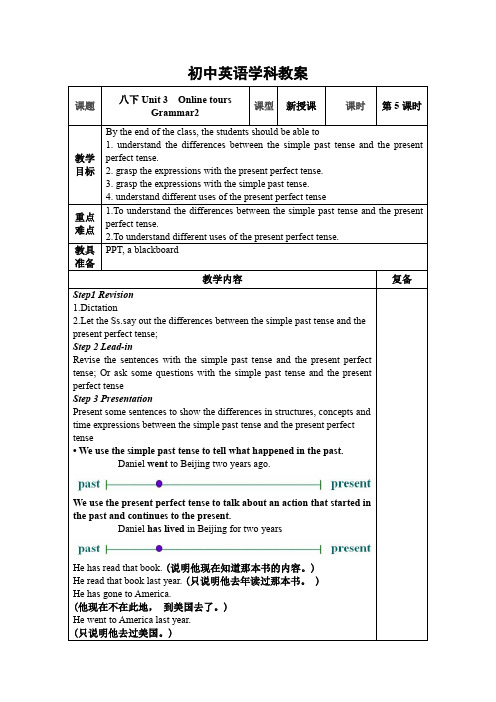
初中英语学科教案Step1 Revision1.Dictation2.Let the Ss.say out the differences between the simple past tense and the present perfect tense;Step 2 Lead-inRevise the sentences with the simple past tense and the present perfect tense; Or ask some questions with the simple past tense and the present perfect tenseStep 3 PresentationPresent some sentences to show the differences in structures, concepts and time expressions between the simple past tense and the present perfect tense• We use the simple past tense to tell what happened in the past.Daniel went to Beijing two years ago.We use the present perfect tense to talk about an action that started in the past and continues to the present.Daniel has lived in Beijing for two yearsHe has read that book. (说明他现在知道那本书的内容。
)He read that book last year. (只说明他去年读过那本书。
)He has gone to America.(他现在不在此地,到美国去了。
译林牛津版英语八年级下册 Unit 3 教学课件 Grammar
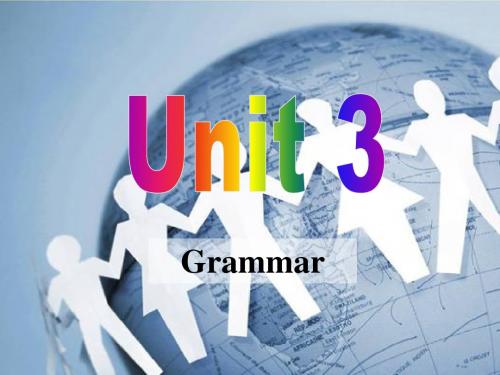
5. — How many times _h_a_v_e_ you _c_o_m__e_ (come) here?
What has the Japanese girl done?
4. The students have copied these words twice. (画线部分提问)
How many times have the students copied these words?
5. He’s never been to Hong Kong , _h_a_s___ __h_e___ ?(反意疑问句)
B: Why don't you buy one? A: It __f_el_l___ (fall) into the river only a moment ago when I washed my hands. Now I've got to fill in a form with a pen.
5. John _h_a_s_n_’_t_c_o_m__e_ (come, not) yet. He will be back in a minute.
6. — _H_a_v_e___you __w_r_i_tt_e_n__(write) a letter to your parents? — Yes. I _w__ro_t_e_____(write) to them yesterday.
比较: 1.The plane has arrived.
- 1、下载文档前请自行甄别文档内容的完整性,平台不提供额外的编辑、内容补充、找答案等附加服务。
- 2、"仅部分预览"的文档,不可在线预览部分如存在完整性等问题,可反馈申请退款(可完整预览的文档不适用该条件!)。
- 3、如文档侵犯您的权益,请联系客服反馈,我们会尽快为您处理(人工客服工作时间:9:00-18:30)。
Unit3 Online tours Grammar学习目标知识点词汇: dream of/about passport句型: Daniel went to Beijing two years ago.Daniel has lived in Beijing for two years.Daniel bought a new computer last month.Daniel has bought a new computer. (He has a computer now.)Mr. Wu visited Canada in 2010 and 2011. (Mr. Wu has been to Canada twice.)学习重难点1.了解一般过去时和现在完成时的区别2.能运用一般过去时和现在完成时造一些句子一、翻译下列词组1.前几天________________________________2.当地的食物______________________________3.品尝著名的天津包子_________________________4.学习游泳______________________________5.梦想环游世界____________________________6.没有护照而周游世界_______________________7.去年夏天爬黄山____________________________8.直到现在_________________________________9.参观故宫博物馆____________________________10.关于美国名胜古迹的书_______________________二、用所给动词的适当形式填空1. I_______(buy)the bike two weeks ago. I _____(have)it for two weeks.2. Great changes _____(take)place in those villages in the past ten years.3. Lisa _________ to the USA a week ago. (go)4. Bob can’t get into the room because he ______(lose)the key to the door.5. Sophia______(finish) her homework 20 minutes ago.6. You can realize your dream by_______ (take) anonline English course.7. Last week, Tim _______ (borrow)a book about the places of interested in the America.8. Annie is a nurse in our hospital. She_______ (work) here for ten years.9. The day before yesterday , I _____(write) a letter to my sister . But she _______(not write) back to me yet.10. Last month, we _____(enjoy) ourselves at the party.11. He can’t go with us. he_________(not finish)the work yet.三、选择题( )1. —When __________you________ the film The Sound of Music?—The day before yesterday.A.have;seenB. will;seeC. did;seeD. did;seen( )2.We _________ trees last Sunday. So far we___________ over 300 trees there.A. planted;plantedB. planted;have plantedC. have planted;plantedD.have planted;have planted( )3. —_______________to the England ?—Not yet.But I went to Canada a few years ago.A.Have you beenB. Have you goneC. Did you goD. Will you go( )4. I will not go to see the film tonight because I ____ my ticket.A. didn’t loseB. have lostC. will loseD. didn’t have( )5. They have ______ since the factory opened.A. left the schoolB. joined the teamC. become workersD. worked here( )6. Ms Chen has taught in this school ______.A. for ten yearsB. ten years agoC. since ten yearsD. for ten years ago( )7. —I ______ today’s homework yet. What aboutyou?—I _______ it just now.A.haven’t finished, have finishedB. didn’t finish, finishedC. haven’t finished, finishedD. didn’t finish, have finished( ) 8. Nice to see you again. I ________ you for a long time.A.hadn’t seenB. haven’t seenC. didn’t seeD. don’t see( ) 9. “_____ your aunt ______ yet?”“Yes, she _____ back a moment ago.”A. Has; come; cameB. Have; come; cameC.Has; came; cameD. Has; come; has come( ) 10.Both his parents look sad . Maybethey _____what's happened to him .A. knewB. have knownC. must knowD. will know四、完型填空Once a foreigner traveling in France came to Paris for a few days. On the very first day of his s___1___ in the French capital,he sent a telegram(电报) to his wife with the name and address of the hotel w____2___ he was staying. Then he decided to go out and see sights in the capital. He took a long w___3____ along the streets of the city, visiting a few museums and by the end of the day he felt tired. He wanted to r ___4___ to the hotel to take a rest there, but suddenly he realized he remembered n___5____ the name nor the address of the hotel. He felt quite w__6___ and slowly walked along the street, not knowing what to do. Suddenly he found h___7__ in front of a post office. He quickly ran in and said in an excited voice.“Give me a telegram form, please.”“Here you are,” a man answered, giving him a form. It didn’t take l___8___ to fill it in. A minute later hehanded in the telegram and paid the man. His wife was greatly s ____9___ when two hours later she received a s___10_____ telegram from her husband, “Send me my address at once.”1.____________2. ____________3.____________4. ____________5.____________6. ____________7.____________ 8. ____________9.____________ 10. ____________答案:一、1.the other day2. local food3. try the famous Tianjin Baozi4. learn to swim5. dream of travelling around the world6. travel around the world without a passport7. climb Mount Huang last summer8. until /till now9. visit the Palace Museum 10. a book about the places of interest in the USA二、1.bought; have had2.have taken3.went4. lost5. finished6.taking7. borrowed8. has worked9. wrote;hasn’t written 10.enjoyed 11. hasn’t finished三、1.C2. B3.A4.B5.D6.A7.C8.B9.A 10.B四、1. stay 2. where 3.walk 4. return 5. neither 6. worried 7. himself 8. long 9. surprised 10. second。
